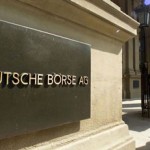Free Money for Germany is Bad News for Euro

When investors are willing to lend money to Germany for two years for free, at a zero interest rate, you know the euro project is in trouble again.
Germany yesterday sold 4.04 billion euros ($5.3 billion) of notes that pay no interest, repayable in September 2016. Investors, it seems, are willing to forego income for the safety of stashing their cash in the AAA-rated government debt of Europe’s biggest economy. That’s a massive vote of no-confidence in the region’s growth prospects.
Here’s a chart showing how much Germany has paid for two-year money in recent years:

Note that on July 18, 2012, Germany sold two-year notes at a negative yield for the first and only time, meaning investors paid 0.06 percent for the privilege of lending to the nation. Back then, the euro debt crisis was reaching its climax, with Spanish 10-year borrowing costs spiking to 7.62 percent at the same time as yields for short-dated Austrian, Finnish and Dutch debt dropped below zero as bond buyers sought safety.
A week after that German auction, European Central Bank President Mario Draghi delivered the rescue speech that turned everything around. “The ECB is ready to whatever it takes to preserve the euro,” he said in London. “And, believe me, it will be enough.”
Trevor Greetham, who helps oversee about $290 billion as head of tactical asset allocation at Fidelity Worldwide Investments, is recommending to investors that they dump the euro, sell the bonds of peripheral euro countries, and stock up on German debt. Draghi’s “magic seems to be wearing thin,” Greetham wrote in an article published in today’s Financial Times:
The current generation of investors is likely to see the euro crisis come and go several times. The euro area is not invulnerable while internal divisions remain. With growth weakening once more it is time to dust off the old euro crisis playbook: short the euro, short the periphery, long Germany.
Two years after Draghi’s speech, the euro region economy risks sliding back into recession and the ECB remains reluctant to unleash the sort of quantitative easing program that seems to have worked for the Federal Reserve and the Bank of England. Free money is great if you’re a German taxpayer; it’s a terrible sign for the euro project.
Source: bloomberg





























